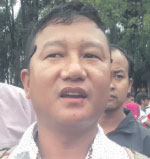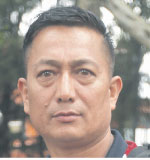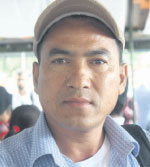KATHMANDU, June 22: Ever since the Taliban in Afghanistan announced a new offensive season after the United States considered strengthening troop levels a few months ago, Nepali security guards were worried by intelligence reports that they were ‘soft targets’, Afghanistan returnees said on Wednesday.

Sup Bahadur Tamang
“Three days before Monday’s devastating Taliban attack, the Canadian embassy had prior information via national security forces intelligence but its Nepali security guards were kept in the dark,” claims Sup Bahadur Tamang, 33, of Kalyanpur-2, Nuwakot distirct.
Tamang, who has served as a security guard in Kabul for more than five years, was airlifted to Kathmandu along with 23 other security guards and 12 bodies of those killed in the suicide bomb attack.
Soon after he disembarked from the Nepal Airlines Corporation plane at Tribhuvan International Airport (TIA), Tamang said, “I am thankful to the government for bringing me home safe but I feel worried about those left behind in Afghanistan.”
Nepali security guards, who have been deployed thick in most of the embassies and diplomatic agencies and at hotels, cafes and business malls frequented by Westerners, have become soft targets, according to the returnees.
Ban Ki-moon condemns Kabul suicide bomb attack

The Taliban had reportedly warned in emails to the media that they would intensify ‘large-scale attacks’, avoiding civilians alone. The security guards, who are either retired Gurkhas personnel or ex-Nepal Army and Police, are vulnerable in the so-called green zone, they said.
Like Tamang, 44-year-old Satyanarayan Shrestha, originally from Gaun Sahar, Lamjung and recently living in Chitwan, worries about Nepali guards still in Afghanistan.

Satya Narayan Shrestha
Private security guards were not considered a ‘soft target’ but the latest brutal attack compelled them to think about their vulnerability, said Shrestha, an ex-Nepal Army soldier who has worked in Kabul for about 10 years.
According to him, though the distances between their living quarters and duty stations were not that great, they had to commute in thin-plated vehicles without any strong security measures.
“The real danger would be while commuting to and from the duty posts,” he added. In this first ever attack targeting Nepali guards, the terrorists took advantage of security loopholes to target a vehicle chauffeured by security guards, challenging the Afghan police and army.
The Afghanistan returnees, who were deputed by recruiting agency Sabre International Security at the Canadian embassy, comprised 147 individuals not counting 33 others who are on leave in Nepal.
“On the day of the attack, I was waiting for replacement by those very guards who were attacked,”51-year-old Lal Bahadur Tamang of Manakamana VDC-3, Nuwakot recalled, surrounded by family at TIA.

Lal Bahadur Tamang
After the attack, he decided to quit his job then and there, he said adding that had there been no NAC special flight from Kabul, they would not have been able to return so soon.
The employer agencies have told the returnees that their salaries would be credited to their bank accounts.
The returnees also said that some Nepali security guards are under immense pressure to continue in their jobs and a few of them are of a mind to do so if security measures were upgraded.
Though the government has no data on the returnees, Tourism Minister Ananda Prasad Pokharel said, “Of late an estimated 20,000 Nepalis are working in Afghanistan.”
In the past 10 years, Nepal allowed more than 9,000 Nepalis to work in Afghanistan and the number of those working there illegally is even higher, according to the Ministry of Labor.
The returnees on Wednesday said they are thankful to the government and others concerned for airlifting them back safely, but added that there is a huge number of other security guards seeking immediate rescue.
“We will soon take action as per the wishes of the migrant workers in Afghanistan,” Minister Pokharel assured the returnees.



































